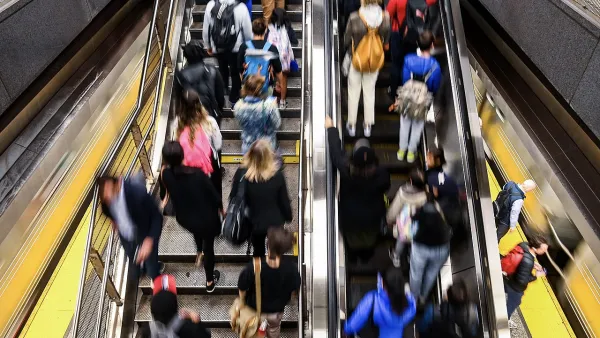It seems to work for the spotless Tokyo subway system, but in grimy New York? A pilot program that removed trash cans in select NYC subway stations resulted in decreased trash hauls (duh) and cleaner stations (huh). Now it's being expanded.
Matt Flegenheimer reports on the New York Metropolitan Transportation Authority's (MTA) counter-intuitive plan to clean up its subway stations by removing trash receptacles. "Officials have described the logic of the program simply: If there is
nowhere to discard trash, riders will take it with them - often outside
of a station."
"Some riders, though, have expressed reservations about the plan," notes Flegenheimer. "Less
trash, they argue, does not imply a more hygienic subway experience."
"'I don't know what to do with this,' Christopher DiScipio, 22, said on
Thursday clutching a nearly-finished apple at the Eighth Street station."
"Nearby, in a narrow alcove between a pay phone kiosk and a vertical
beam, riders appeared to have fashioned a rogue receptacle. Detritus
piled about three feet high - a mélange of crushed energy drink cans;
bottles of water and, in at least one case, vodka; mounds of wrappers
and paper cups; and what appeared to have once been a white T-shirt."
FULL STORY: M.T.A. Expands an Effort to Decrease Subway Trash

Planetizen Federal Action Tracker
A weekly monitor of how Trump’s orders and actions are impacting planners and planning in America.

Chicago’s Ghost Rails
Just beneath the surface of the modern city lie the remnants of its expansive early 20th-century streetcar system.

Amtrak Cutting Jobs, Funding to High-Speed Rail
The agency plans to cut 10 percent of its workforce and has confirmed it will not fund new high-speed rail projects.

Ohio Forces Data Centers to Prepay for Power
Utilities are calling on states to hold data center operators responsible for new energy demands to prevent leaving consumers on the hook for their bills.

MARTA CEO Steps Down Amid Citizenship Concerns
MARTA’s board announced Thursday that its chief, who is from Canada, is resigning due to questions about his immigration status.

Silicon Valley ‘Bike Superhighway’ Awarded $14M State Grant
A Caltrans grant brings the 10-mile Central Bikeway project connecting Santa Clara and East San Jose closer to fruition.
Urban Design for Planners 1: Software Tools
This six-course series explores essential urban design concepts using open source software and equips planners with the tools they need to participate fully in the urban design process.
Planning for Universal Design
Learn the tools for implementing Universal Design in planning regulations.
Caltrans
City of Fort Worth
Mpact (founded as Rail~Volution)
City of Camden Redevelopment Agency
City of Astoria
City of Portland
City of Laramie





























